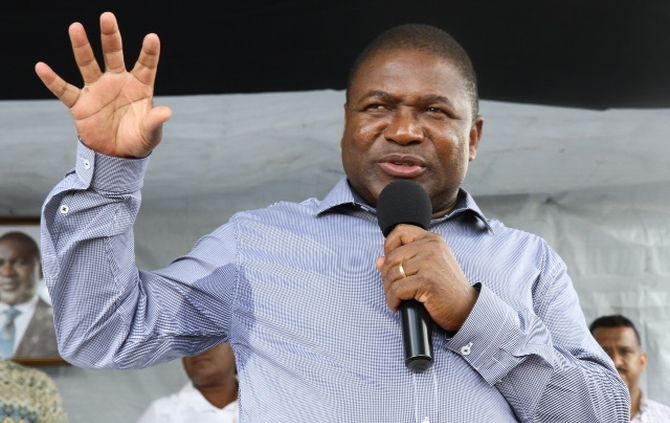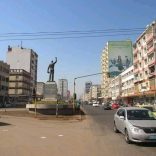Mozambique: Kidnapped businessman freed after more than two months in captivity
Veterans should be example of forgiveness – Nyusi

File photo / President Filipe Nyusi
Mozambican President Filipe Nyusi on Wednesday urged veterans of the independence war to continue acting as a reference point for peaceful coexistence, in order to allow the continued rise in production and productivity necessary for the country to make progress.
He was speaking in the northern city of Pemba, at the celebrations of “Victory Day”, the anniversary of the agreement on Mozambican independence signed in Lusaka between the victorious Mozambique Liberation Front (Frelimo) and the Portuguese government on 7 September 1974.
Nyusi urged all veterans, not only from the liberation war, but also from the succeeding wars that defended the country against Rhodesian and apartheid aggression, to opt for non-violent actions that stimulate the country’s growth.
The President said that the former Frelimo guerrillas, who had fought for the country’s independence from colonial rule, should be actively involved in the drive to increase agricultural production, and to ensure rising income.
The veterans of the liberation war, he declared, should continue to set “an example of forgiveness and social inclusion”. He noted that his Pemba audience included veterans, demobilized soldiers, and people who had been members not only of Frelimo, but of its precursors such as Udenamo (National Democratic Union of Mozambique): he regarded them as an example of “national unity and social inclusion”.
Turning to the attacks mounted by gunmen of the Renamo rebels in various parts of the country, Nyusi said these were attempts “to destabilize all the efforts undertaken by the government to improve living standards”.
He noted that Renamo has begun to kill veterans – recent reports indicate that over the past fortnight at least three veterans have been murdered in attacks in widely separated parts of Mozambique. Nyusi added that just a few hours earlier, on Wednesday morning, Renamo had attacked the administrative post of Muaquia, in the central province of Zambezia. Such attacks showed that Renamo “wishes to seize power through force”.
Former President Joaquim Chissano also spoke at the Pemba rally, and urged Renamo to use democratic methods and lay down its guns.
“We shall receive them and live with them as brothers, just as we did previously”, he said, referring to the period between the 1992 peace agreement which he signed with Renamo leader Afonso Dhlakama, and Dhlakama’s decision to go back to war in 2013.
The renewed Renamo insurgency appeared to end on 5 September 2014, when Chissano’s successor, Armando Guebuza, signed an agreement on a cessation of hostilities with Dhlakama. Renamo never implemented the clauses in that agreement which obliged it to disarm and demobilize, and in February 2016 it resumed its war.
Chissano declared that nobody wants war in Mozambique – not even those who have been recruited into the ranks of the Renamo militia.
The former President also recalled that attempts to frustrate Mozambican independence went back to the final days of colonial rule. The colonial government had wanted a transitional government that would have lasted for 20 years, but Frelimo insisted on a transition of just a few months, culminating in full independence on 25 June 1975.
Far right factions among the settlers tried to frustrate the Lusaka agreement staging a short lived uprising, in which they briefly seized control of Radio Mozambique. After these attempts to sabotage independence had failed, the Ian Smith regime in what was then Rhodesia set up the force that would eventually call itself Renamo, and, at the time of Zimbabwean independence in 1980, control over Renamo passed into the hands of apartheid military intelligence.
A very different tone was set by Fernando Faustino, General Secretary of the Association of Veterans of the National Liberation Struggle (ACLLN), who urged Nyusi to ensure that guns are distributed to veterans so that they can defend themselves against Renamo.
Describing Dhlakama as “an agent of imperialism”, Faustino demanded that Renamo halt its attacks, and embark on a serious dialogue with the government. The attacks waged by the Renamo militia, he said, meant that Dhlakama and his organisation “should be treated as enemies of the Mozambican people”.
Faustino warned that, just as the colonial regime had been defeated, so Renamo too would be defeated .
“We are fed up with being killed by Renamo’s gunmen”, he said. “Renamo and its leader only have one way out, which is to accept political dialogue with the Mozambican government”. He stressed that the veterans are willing to take up arms again to respond to the Renamo attacks.
Faustino also denounced unnamed forces that were supposedly interfering in the governance of Mozambique. Those who intervene in Mozambique’s internal affairs “will be smashed by the defence and security forces”, he threatened.












Leave a Reply
Be the First to Comment!
You must be logged in to post a comment.
You must be logged in to post a comment.